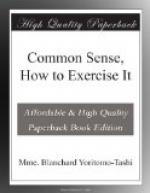“The nobleman declared that he had never heard anything more beautiful.
“‘That is true,’ said Lang-Ho, ’but you ought to have said this the first time you heard it.’
“And he revealed to the prince that these verses were those of the young man whom he had judged so harshly.”
From this story two lessons may be drawn:
The first is, that if common sense indicates that judgment should not change from scorn to enthusiasm, when it is a question of the same object, practical sense insists that one should be certain of impartiality of judgment, by avoiding the influence of questions which relate to environment and surrounding circumstances.
The second concerns opportunity.
We have already had occasion to say how much some things, which seem desirable at certain times, are questionable when the situation changes.
Bad humor creates ill-will; therefore it is abominably stupid to provoke the manifestation of the second when one has proved the existence of the first.
In order that there may be a connection between the faculty of judgment and that of deduction, it is essential that nothing should be allowed to interpose itself between these two phases of the argument.
Harmony between all judgments is founded on common sense, but it is practical common sense, which indicates this harmony with precision.
It is also practical common sense which serves as a guide to the orator who wishes to impress his audience.
He will endeavor first to choose a subject which will interest those who listen to him.
In this endeavor he ought, above all, to consult opportunity.
And, as we have remarked on many occasions, the Shogun expresses theories on this subject, to which the people of the twentieth century could not give too much earnest consideration.
“There are,” said he, “social questions, as, for example, dress and custom.
“With time, opinions change, as do forms and manners, and this is quite reasonable.
“The progress of science by ameliorating the general conditions of existence, introduces a need created by civilization which rejects barbarous customs; the mentality of a warrior is not that of an agriculturist; the man who thinks about making his possessions productive has not the same inclinations as he whose life is devoted to conquest, and the sweetness of living in serenity, by modifying the aspirations, metamorphoses all things.
“In order to lead attention in the direction which is governed by reason, it is indispensable for the orator that he should expound a subject whose interpretation will satisfy the demand of opportunity, which influences every brain.
“Practical sense will make him take care to speak only of things that he has studied thoroughly.
“It will induce him to expound his theory in such a way that his hearers will have to make no effort to assimilate it.




